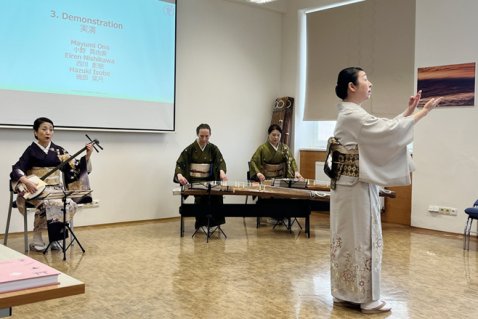International Relations and European Studies
Metropolitan University Prague, within the scope of the International Territorial Studies programme, offers a Doctoral Degree study specialisation of International Relations and European Studies in both Czech and English.
Study Objectives
The Doctoral Degree study programme of International Relations and European Studies – IRES (in English) aims to prepare its graduates for basic and applied research in the field of international relations and European integration. In particular, this study programme highlights comprehensive and well-researched theoretical and methodological treatment of the relevant issues in order to ensure that the accomplishments of its graduates reach a level comparable to the accomplishments of graduates of leading foreign universities. In addition to mastering research and research related activities, the graduates will also be qualified for pedagogical activities. The standard length of the Doctoral Degree study programme is three years.
Curriculum
- legally attested (certified/notarised) copy of Master’s Diploma (applicants who completed their Master’s Degree at a university that is not accredited by the Ministry of Education, Youth, and Sports of the Czech Republic, must also provide a document verifying official recognition of their diploma by the Ministry of Education, Youth, and Sports of the Czech Republic, i.e. "nostrification" in Czech)
- specialisation-related examination
- examination in the English language
Section I (Compulsory Courses)
- Theories of International Relations and European Integration Process
- Research Methods of International Relations
Section II
In addition to the compulsory courses of the first section, students must choose two ‘free-choice’ specialisation courses in their second year of study:
- International Security
- Conflict Resolution
- Current Issues of the European Integration Process
- International Relations and Global Issues
Section III (European Integration)
- The Institutional Structure and Decision–Making Processes in the EU
- European Union Policies
- Current Issues of the European Integration Process
All admitted applicants are entitled to enrol in the first year of study. In order to enrol in the second year of study, students must complete all first-section courses, meet further requirements stated in the individual study plan, and present written proof of their research activities.
In order to enrol in the third year of study, students must complete examinations stated in their individual study plan, comply with further assigned tasks and present written proof of the results of their research activities. In exceptional cases, it is possible to allow conditional enrolment to the subsequent year of study.
Field of Study: Political Sciences
Standard length of study: 3 years
Language instruction: English
Place of instruction: Prague
INTERNATIONAL COOPERATION
Erasmus+ study stays and traineeships
Graduate Career Options
- public and private research institutions
- academic positions at universities
- international organisation
- EU institutions
- media
- public administration
- non-governmental organisations
Doctoral board
prof. Mgr. Oldřich Bureš, Ph.D., M.A. (Chair)
prof. JUDr. PhDr. Veronika Bílková, Ph.D., E.MA.
doc. Mats Braun, Ph.D.
prof. PhDr. RNDr. Nikola Hynek, M.A., PgDip Res, Ph.D.
JUDr. PhDr. Tomáš Karásek, Ph.D.
doc. PhDr. Jan Karlas, Ph.D.
prof. Mgr. Ing. Petr Kratochvíl, Ph.D.
prof. JUDr. PhDr. Miroslav Mareš, Ph.D.
doc. Monika Brusenbauch Meislová, Ph.D.
doc. Ing. Mgr. Štěpánka Zemanová, Ph.D.
 Required Documents
Required Documents
The following documents form an integral part of the application to the Doctoral Degree study programme and must be submitted within the stipulated deadline:
- an outline of the Doctoral Thesis, including:
a clearly defined thesis topic
a theoretical framework of the thesis
the research methods used
a description and timeline of the thesis project
- a list of secondary sources (reading list) with particular regard to the field of the applicant's specialised field of interest
- a list of the applicant's previous activities, in particular:
publications
participation in research projects
participation in specialised conferences, seminars, workshops, etc.
The documents are to be uploaded to the online application; should you need further details or experience any difficulties, feel free to contact us at phd@mup.cz.
Completed Master's Degree documented by a certified copy of the applicant’s Master’s Diploma is one of the main requirements for admission. In addition, applicants who completed their previous university education at a higher education institution that is not accredited by the Ministry of Education, Youth, and Sports of the Czech Republic are required to submit a document verifying official recognition of their university education by the Ministry of Education, Youth, and Sports of the Czech Republic, i.e. “nostrification” in Czech.
Each doctoral student may apply for monthly bursary of CZK 15 000 since the beginning of the doctoral studies.
International Relations and European Studies
The admission procedure to the Doctoral Degree consists of two rounds:
The first round takes place in the applicants’ absence. The Entrance Examination Committee shall assess the submitted outlines of Doctoral Theses, the applicants’ research activities, and the submitted lists of secondary sources. Proposals that do not correspond with the area of study or insufficiently elaborated proposals shall be removed by the Committee from the admission procedure.
The second round is organised as follows: two weeks in advance, MUP shall send invitations to the entrance examination to all Doctoral Degree applicants who successfully passed the first round of the admission procedure.
The entrance examination consists of:
- The specialisation-related examination which takes the form of a critical discussion with the Entrance Examination Committee in the English language on subject matters relating to the specialisation, and is based on the documents submitted together with the application. The applicant’s interest in the area of study, his/her knowledge of the subject matter, and his/her overall qualification for Doctoral Degree studies are assessed.
- The examination in English which consists of an interview conducted in the English language about the applicant’s relation to the area of study and the Doctoral Thesis topic; reading of a specialised text in English and its oral interpretation, and – as the case may be – of supplementary questions regarding English grammar. Each part of the entrance examination shall be evaluated according to the following scale: 1 - excellent, 2 - very good, 3 - good, 4 - fail. Should any part of the examination be evaluated as 4, i.e. fail, the applicant shall fail the entrance examination.
For successful applicants, the Entrance Examination Committee shall calculate an average evaluation from both parts of the entrance examination. In this average evaluation, the specialised part of the examination shall count twice. The average shall be rounded off according to the third decimal place. In the final assessment of applicants, the Entrance Examination Committee shall take into consideration the final average evaluation of both rounds of the admission procedure.



